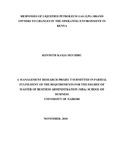| dc.contributor.author | Muchiru, Kenneth K | |
| dc.date.accessioned | 2013-03-15T12:42:43Z | |
| dc.date.issued | 2010-11 | |
| dc.identifier.citation | MBA Thesis | en |
| dc.identifier.uri | http://erepository.uonbi.ac.ke:8080/xmlui/handle/123456789/14157 | |
| dc.description.abstract | Organizations are in constant two-way interaction with the environment. According to
Ansoff and McDonnell (2000) organizations are environment dependent and environment
serving. They receive inputs from the environment, transform or add value to them, and
return the outputs in form of goods and services back to the environment. They therefore
affect and are affected by what happens in the external environment, which is beyond the
organization’s control. Environmental change creates pressure for change in the organization
and this means that they have to respond to relevant external change to ensure that they
survive.
The study used a census survey design to achieve the set objectives. This study sought to
establish the responses of Liquefied Petroleum Gas (LPG) to changes in the operating
environment. The target population for this study comprised of all LPG Brand Owners in
Kenya. Marketing managers or Operations managers were chosen from each of the 7 LPG
band owners. Data was collected using questionnaires. The collected data was analyzed using
descriptive statistics.
The study found that having a long term hospitality agreement would be a major response to
changes in operating environment by LPG firms. Other responses changes in the operating
environment by LPG firm revealed in this study were matching the competitor in price
strategies they adopt, having an aggressive advertising campaign and working on establishing
more outlets. Lobbying the government through Petroleum Institute of East Africa (PIEA) to
tighten the legislation and licensing of LPG operators would also be a major response to
changes in the operating environment by LPG firm.
Due to financial constraints and a short time frame within which the results of this study must
be produced the study was limited to establishing the responses of Liquefied Petroleum Gas
(LPG) brand owners to changes in the operating environment in Kenya. From the above
recommendation the study recommends that further studies to be carried out to establish the
impact of new Government regulations on the standardization of valves and cylinders.
Further study can also be carried out on the perception of Safety and LPG handling by
consumers. | en |
| dc.description.sponsorship | University of Nairobi | en |
| dc.language.iso | en | en |
| dc.subject | Liquefied Petroleum Gas (LPG) | en |
| dc.subject | Operating environment | en |
| dc.subject | Kenya | en |
| dc.title | Responses of liquefied petroleum gas (LPG) brand owners to changes in the operating environment in Kenya | en |
| dc.type | Thesis | en |
| local.embargo.terms | 6 months | en |
| local.publisher | School of Business, University of Nairobi | en |

